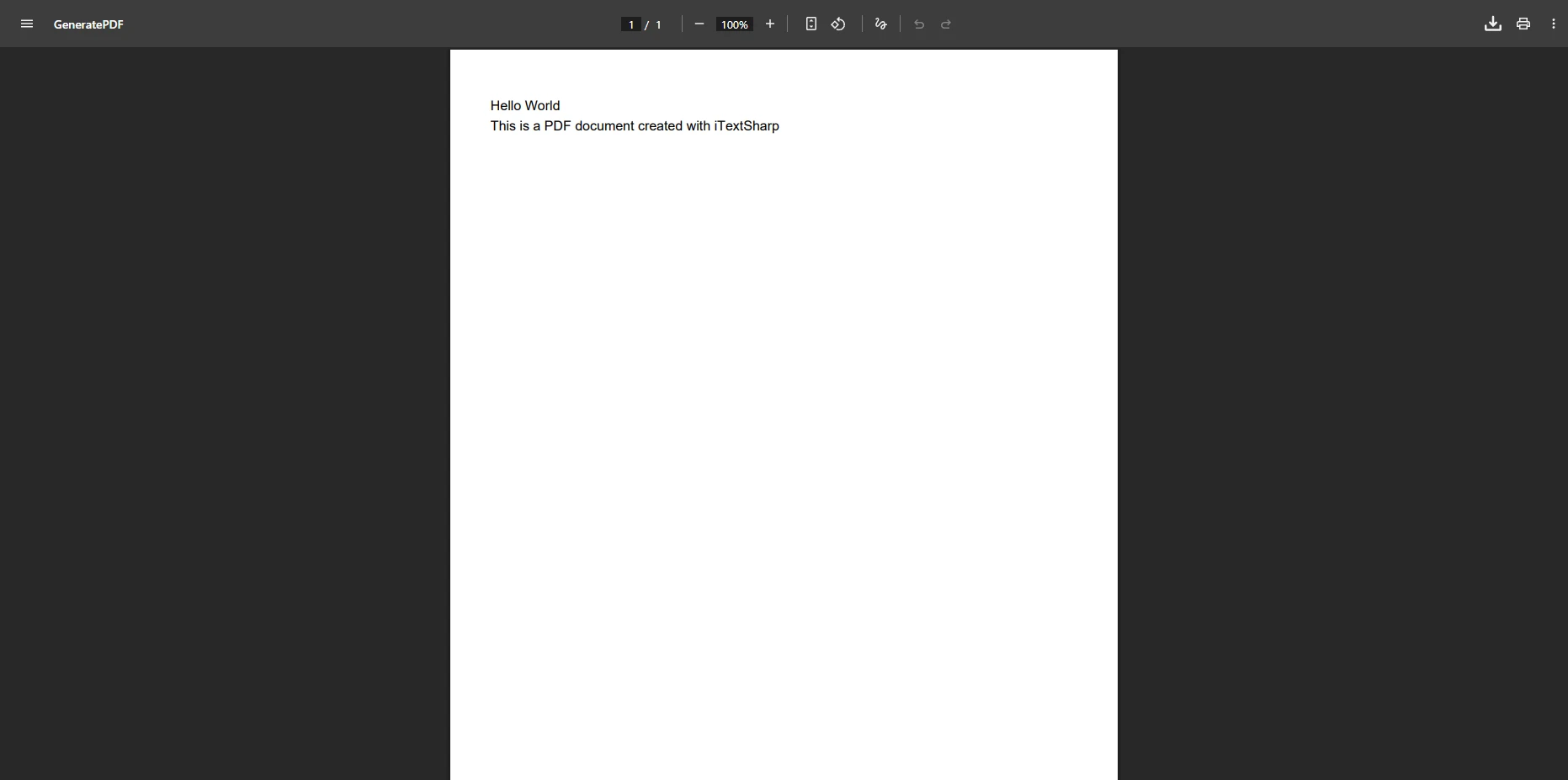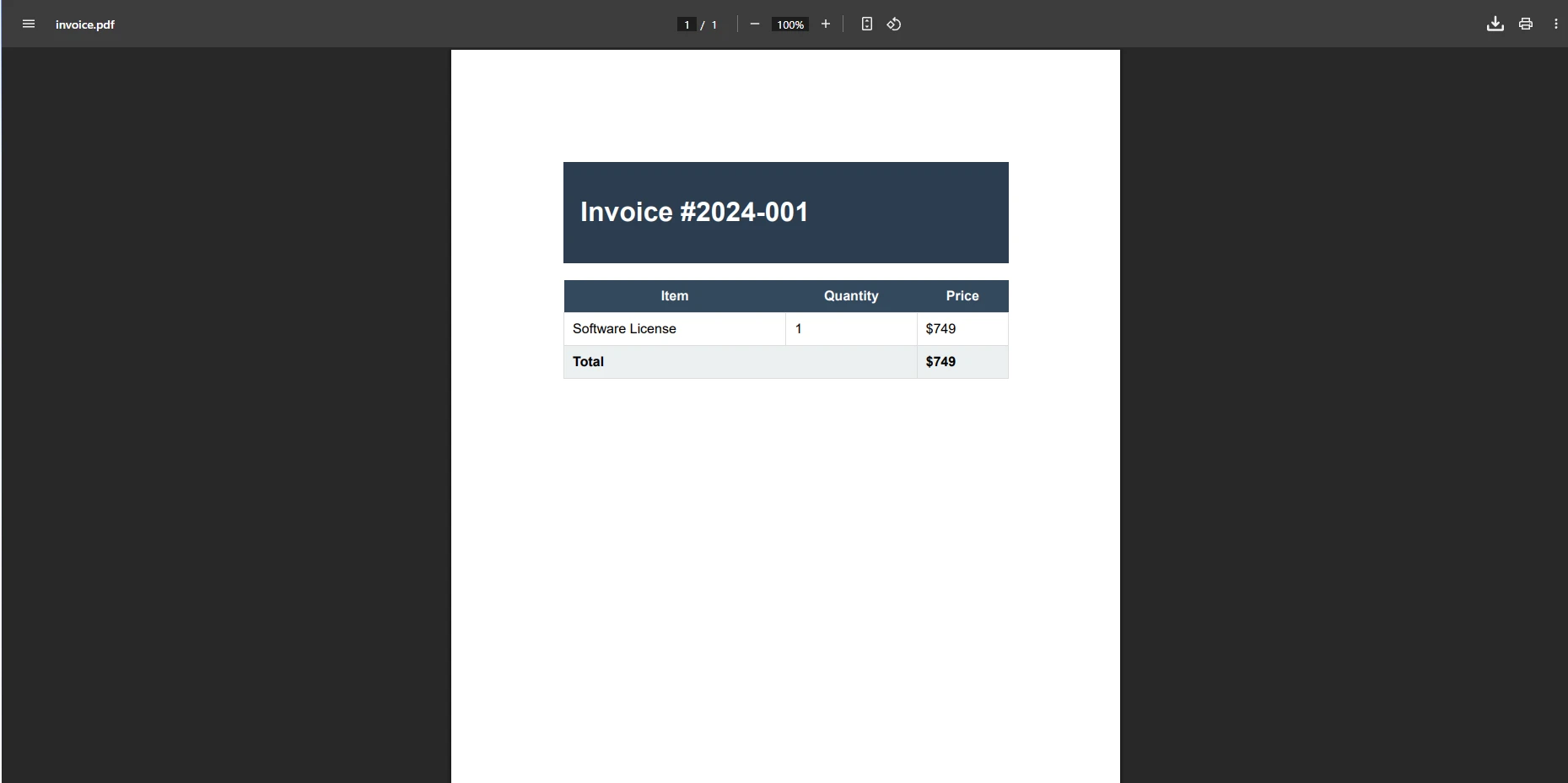Foxit PDF SDK C# Alternatives - Comparison with IronPDF
IronPDF excels with smooth HTML-to-PDF conversion and modern CSS framework support for .NET environments, while Foxit PDF SDK offers broader platform compatibility but requires more complex implementation and lacks native HTML conversion capabilities.
PDF documents have become the standard format for sharing and presenting information across industries. When you need to generate PDF documents from your applications or manipulate existing ones, PDF processing SDKs provide essential functionality. These SDKs offer the necessary tools and features to create, edit, and manipulate PDF documents within your applications.
Foxit PDF SDK and IronPDF represent two established PDF processing SDKs in the market. Both SDKs provide complete features for your development needs, but they differ in key aspects that affect their suitability for different scenarios.
This article examines the features and benefits of Foxit PDF SDK and IronPDF through detailed comparison. You'll discover the strengths and weaknesses of each SDK through complete evaluation of their capabilities. This analysis will help you choose the PDF processing SDK that best suits your specific requirements.
What Is IronPDF and Its Core Capabilities?
IronPDF is a effective PDF processing SDK developed by Iron Software that allows you to create, edit, and manipulate PDF documents within your .NET applications. It provides complete tools and features for working with PDF documents regularly. For enterprise environments requiring security compliance, IronPDF offers detailed security documentation and maintains active certifications.
What Makes IronPDF Different from Other PDF Libraries?
How Does HTML to PDF Conversion Work in IronPDF?
IronPDF enables you to convert HTML code to PDF documents efficiently. The conversion process runs quickly while giving you control through options like page size, margins, and orientation. IronPDF supports advanced formatting including headers and footers, allowing you to fine-tune the PDF layout. You can specify which HTML elements to include in the PDF output, providing greater control over document content. For complex layouts, see the page breaks guide.
Why Is PDF Generation from Multiple Sources Important?
IronPDF's ability to generate PDFs from various sources—including HTML, URL, JavaScript, CSS, and image formats—proves essential for modern applications. You can create PDF documents directly from web pages or images without manual conversion. Using IronPDF's advanced Chrome rendering engine, you can convert complex web pages into high-quality PDFs accurately. This feature simplify PDF report generation, invoices, and other documents on demand. The library supports JavaScript execution and custom render delays for dynamic content.
When Should You Use PDF Extraction Features?
IronPDF's extraction features enable you to extract various content types from PDF documents, including text, images, and data. This functionality helps repurpose content or analyze PDF data effectively. IronPDF provides advanced text extraction capabilities that preserve formatting integrity. Additionally, you can extract images in formats like PNG or JPEG. These extraction features provide flexible and efficient tools for working with PDF data.
Which Advanced Features Does IronPDF Offer for Enterprise Use?
How Do Annotations and Form Filling Improve User Interaction?
IronPDF supports annotations and form filling, essential for interactive PDF applications. You can add text, images, and elements to PDFs while including form fields for user input. IronPDF provides APIs for form data manipulation, enabling extraction and processing within your applications. For compliance needs, IronPDF supports PDF/A format for archival and PDF/UA for accessibility. The library meets Section 508 compliance for government requirements.
What PDF Output Control Options Are Available?
IronPDF provides complete output control options. You can set properties like page size, margins, and orientation. You can specify compression level, security settings, and advanced options. IronPDF handles page operations including merging, splitting, and reordering pages. The library supports custom paper sizes and page breaks control.
Why Does Multithreading and Asynchronous Support Matter for Performance?
IronPDF provides full multithreading and asynchronous support to improve performance. With multithreading, you can process PDFs on multiple threads simultaneously for faster execution. Asynchronous support handles long-running tasks like conversion or extraction without blocking your main thread. This ensures your application remains responsive while providing better user experience. These features help you create efficient and reliable high-performance applications. See the performance assistance guide for optimization tips.
How Does IronPDF Handle Security and Compliance Requirements?
What Security Features Does IronPDF Provide for Enterprise Use?
IronPDF's security features give you complete tools to protect PDF documents, ensuring data safety and integrity. You can set password protection at document or page level, restricting access to specific functions. Encryption options include 40-bit and 128-bit encryption for reliable unauthorized access protection. Digital signatures and certificate management authenticate signers and ensure document integrity. These features make IronPDF excellent for applications requiring sensitive data protection. IronPDF supports signing PDFs with HSM for hardware-based security. Additional features include PDF sanitization and redaction capabilities.
How Does .NET Language Support Benefit Enterprise Development?
IronPDF integrates seamlessly with .NET languages including C#, VB.NET, and F#. The SDK provides APIs that simplify PDF creation, editing, and manipulation within your .NET applications. You can use extensive documentation and examples to get started quickly. IronPDF is also available for Java. For enterprise deployment, IronPDF offers guides for Azure deployment, AWS deployment, and Docker containerization. The library supports MAUI applications and Blazor Server.
What Are Foxit PDF SDK's Enterprise Features?
Foxit PDF SDK is a complete software development kit for integrating PDF functionality into your applications. It offers features for creating, reading, editing, and annotating PDF documents, plus file conversion capabilities. For alternative comparisons, see Aspose vs IronPDF and iText vs IronPDF.
What Document Processing Capabilities Does Foxit PDF SDK Provide?
How Does PDF Creation and Conversion Work in Foxit?
Foxit PDF SDK lets you create new PDFs from scratch or convert existing documents to PDF format. It supports various file formats including Microsoft Word, Excel, PowerPoint, and others. The SDK handles conversion from image formats like JPEG, PNG, and TIFF to PDF. For advanced conversion, IronPDF offers DOCX to PDF conversion, RTF to PDF, and XML to PDF capabilities.
What PDF Editing Features Are Available?
Foxit PDF SDK provides effective editing tools for modifying PDFs. These include text editing, image cropping, page rearrangement, and adding watermarks or backgrounds. The SDK enables adding or deleting pages, merging or splitting files, and modifying metadata. IronPDF offers find and replace text, draw lines and rectangles, and stamp text and images.
How Can Developers Add PDF Annotations?
Foxit PDF SDK enables annotation additions including highlights, comments, stamps, and visual aids. It provides custom annotation tool creation like signatures or rubber stamps. IronPDF provides similar annotation capabilities with support for bookmarks and table of contents generation.
Which Security and Optimization Features Does Foxit PDF SDK Include?
What Security Options Does Foxit PDF SDK Offer?
Foxit PDF SDK provides security features protecting PDFs from unauthorized access. This includes password protection, digital signatures, encryption, and certificate management. IronPDF offers comparable security features with support for revision history and document flattening.
How Does PDF Optimization Improve Performance?
Foxit PDF SDK includes optimization tools for faster loading and performance. Features include compression, image downsampling, font embedding, and more. These optimizations reduce file sizes and improve load times for better accessibility. IronPDF provides advanced compression options and linearization for fast web view.
When Should You Use PDF Form Filling Features?
Foxit PDF SDK enables creating and filling PDF forms, including dynamic forms filled programmatically. The SDK supports form field validation and data extraction for easier collection and analysis. IronPDF offers complete form creation and form editing with interactive field support.
Why Is PDF Extraction Important for Data Processing?
- Bootstrap 5: Complete support for flexbox layouts, CSS Grid, utility classes, and all component systems
- Bootstrap 4: Full card components, navigation elements, flex utilities, and responsive design
- Tailwind CSS: All utility classes render accurately
- Foundation: Complete grid system and component library
- Modern CSS3: Flexbox, CSS Grid, custom properties, animations, transitions, and transforms
Real-world validation: IronPDF renders the Bootstrap homepage and official examples with pixel-perfect accuracy. For advanced scenarios, use the Chrome rendering engine documentation. The library supports web fonts and icon fonts for complete design fidelity.
Code Example: Notification System with Alerts
using IronPdf;
// Set your IronPDF license key
IronPdf.License.LicenseKey = "License-Key goes here";
var renderer = new ChromePdfRenderer();
string bootstrapNotifications = @"
<!DOCTYPE html>
<html>
<head>
<link href='___PROTECTED_URL_88___ rel='stylesheet'>
<style>
.notification-card {
border-left: 4px solid;
transition: transform 0.2s;
}
.notification-card:hover { transform: translateX(5px); }
.notification-icon {
width: 48px;
height: 48px;
display: flex;
align-items: center;
justify-content: center;
border-radius: 50%;
font-size: 1.5rem;
}
</style>
</head>
<body>
<div class='container my-5'>
<h1 class='mb-4'>System Notifications Dashboard</h1>
<div class='row g-4 mb-4'>
<div class='col-md-3'>
<div class='card text-center bg-success text-white'>
<div class='card-body'>
<h2 class='display-4 mb-0'>42</h2>
<p class='mb-0'>Success</p>
</div>
</div>
</div>
<div class='col-md-3'>
<div class='card text-center bg-warning text-dark'>
<div class='card-body'>
<h2 class='display-4 mb-0'>8</h2>
<p class='mb-0'>Warnings</p>
</div>
</div>
</div>
<div class='col-md-3'>
<div class='card text-center bg-danger text-white'>
<div class='card-body'>
<h2 class='display-4 mb-0'>3</h2>
<p class='mb-0'>Errors</p>
</div>
</div>
</div>
<div class='col-md-3'>
<div class='card text-center bg-info text-white'>
<div class='card-body'>
<h2 class='display-4 mb-0'>156</h2>
<p class='mb-0'>Info</p>
</div>
</div>
</div>
</div>
<div class='alert alert-success d-flex align-items-center mb-3' role='alert'>
<div class='notification-icon bg-white text-success me-3'>✓</div>
<div class='flex-grow-1'>
<h5 class='alert-heading mb-1'>Deployment Successful</h5>
<p class='mb-0'>Your application has been deployed to production successfully.</p>
<small class='text-muted'>2 minutes ago</small>
</div>
<button type='button' class='btn-close'></button>
</div>
<div class='alert alert-info d-flex align-items-center mb-3' role='alert'>
<div class='notification-icon bg-white text-info me-3'>ℹ</div>
<div class='flex-grow-1'>
<h5 class='alert-heading mb-1'>System Update Available</h5>
<p class='mb-0'>A new system update (v2.5.1) is available for installation.</p>
<small class='text-muted'>15 minutes ago</small>
</div>
<button type='button' class='btn-close'></button>
</div>
<div class='alert alert-warning d-flex align-items-center mb-3' role='alert'>
<div class='notification-icon bg-white text-warning me-3'>⚠</div>
<div class='flex-grow-1'>
<h5 class='alert-heading mb-1'>High CPU Usage Detected</h5>
<p class='mb-0'>CPU usage has exceeded 85% for the past 10 minutes. Consider scaling resources.</p>
<small class='text-muted'>1 hour ago</small>
</div>
<button type='button' class='btn-close'></button>
</div>
<div class='alert alert-danger d-flex align-items-center mb-3' role='alert'>
<div class='notification-icon bg-white text-danger me-3'>✗</div>
<div class='flex-grow-1'>
<h5 class='alert-heading mb-1'>Database Connection Failed</h5>
<p class='mb-0'>Unable to establish connection to the primary database server. Failover initiated.</p>
<small class='text-muted'>3 hours ago</small>
</div>
<button type='button' class='btn-close'></button>
</div>
<div class='card'>
<div class='card-header bg-primary text-white'>
<h5 class='mb-0'>Recent Activity Log</h5>
</div>
<div class='card-body p-0'>
<ul class='list-group list-group-flush'>
<li class='list-group-item notification-card border-success'>
<div class='d-flex align-items-start'>
<span class='badge bg-success me-3 mt-1'>SUCCESS</span>
<div class='flex-grow-1'>
<strong>Backup Completed</strong>
<p class='mb-1 text-muted'>Daily backup completed successfully. 2.4 GB backed up.</p>
<small class='text-muted'>Today at 3:00 AM</small>
</div>
</div>
</li>
<li class='list-group-item notification-card border-info'>
<div class='d-flex align-items-start'>
<span class='badge bg-info me-3 mt-1'>INFO</span>
<div class='flex-grow-1'>
<strong>User Login</strong>
<p class='mb-1 text-muted'>Admin user logged in from 192.168.1.100</p>
<small class='text-muted'>Today at 8:30 AM</small>
</div>
</div>
</li>
<li class='list-group-item notification-card border-warning'>
<div class='d-flex align-items-start'>
<span class='badge bg-warning text-dark me-3 mt-1'>WARNING</span>
<div class='flex-grow-1'>
<strong>SSL Certificate Expiring</strong>
<p class='mb-1 text-muted'>SSL certificate for api.example.com expires in 30 days</p>
<small class='text-muted'>Today at 9:15 AM</small>
</div>
</div>
</li>
<li class='list-group-item notification-card border-success'>
<div class='d-flex align-items-start'>
<span class='badge bg-success me-3 mt-1'>SUCCESS</span>
<div class='flex-grow-1'>
<strong>Security Scan Completed</strong>
<p class='mb-1 text-muted'>No vulnerabilities detected in latest scan</p>
<small class='text-muted'>Today at 10:00 AM</small>
</div>
</div>
</li>
</ul>
</div>
</div>
<div class='mt-4 d-flex justify-content-between align-items-center'>
<button class='btn btn-outline-primary'>Mark All as Read</button>
<button class='btn btn-outline-secondary'>Clear All</button>
<button class='btn btn-primary'>View All Notifications</button>
</div>
</div>
</body>
</html>";
var pdf = renderer.RenderHtmlAsPdf(bootstrapNotifications);
pdf.SaveAs("notifications-dashboard.pdf");using IronPdf;
// Set your IronPDF license key
IronPdf.License.LicenseKey = "License-Key goes here";
var renderer = new ChromePdfRenderer();
string bootstrapNotifications = @"
<!DOCTYPE html>
<html>
<head>
<link href='___PROTECTED_URL_88___ rel='stylesheet'>
<style>
.notification-card {
border-left: 4px solid;
transition: transform 0.2s;
}
.notification-card:hover { transform: translateX(5px); }
.notification-icon {
width: 48px;
height: 48px;
display: flex;
align-items: center;
justify-content: center;
border-radius: 50%;
font-size: 1.5rem;
}
</style>
</head>
<body>
<div class='container my-5'>
<h1 class='mb-4'>System Notifications Dashboard</h1>
<div class='row g-4 mb-4'>
<div class='col-md-3'>
<div class='card text-center bg-success text-white'>
<div class='card-body'>
<h2 class='display-4 mb-0'>42</h2>
<p class='mb-0'>Success</p>
</div>
</div>
</div>
<div class='col-md-3'>
<div class='card text-center bg-warning text-dark'>
<div class='card-body'>
<h2 class='display-4 mb-0'>8</h2>
<p class='mb-0'>Warnings</p>
</div>
</div>
</div>
<div class='col-md-3'>
<div class='card text-center bg-danger text-white'>
<div class='card-body'>
<h2 class='display-4 mb-0'>3</h2>
<p class='mb-0'>Errors</p>
</div>
</div>
</div>
<div class='col-md-3'>
<div class='card text-center bg-info text-white'>
<div class='card-body'>
<h2 class='display-4 mb-0'>156</h2>
<p class='mb-0'>Info</p>
</div>
</div>
</div>
</div>
<div class='alert alert-success d-flex align-items-center mb-3' role='alert'>
<div class='notification-icon bg-white text-success me-3'>✓</div>
<div class='flex-grow-1'>
<h5 class='alert-heading mb-1'>Deployment Successful</h5>
<p class='mb-0'>Your application has been deployed to production successfully.</p>
<small class='text-muted'>2 minutes ago</small>
</div>
<button type='button' class='btn-close'></button>
</div>
<div class='alert alert-info d-flex align-items-center mb-3' role='alert'>
<div class='notification-icon bg-white text-info me-3'>ℹ</div>
<div class='flex-grow-1'>
<h5 class='alert-heading mb-1'>System Update Available</h5>
<p class='mb-0'>A new system update (v2.5.1) is available for installation.</p>
<small class='text-muted'>15 minutes ago</small>
</div>
<button type='button' class='btn-close'></button>
</div>
<div class='alert alert-warning d-flex align-items-center mb-3' role='alert'>
<div class='notification-icon bg-white text-warning me-3'>⚠</div>
<div class='flex-grow-1'>
<h5 class='alert-heading mb-1'>High CPU Usage Detected</h5>
<p class='mb-0'>CPU usage has exceeded 85% for the past 10 minutes. Consider scaling resources.</p>
<small class='text-muted'>1 hour ago</small>
</div>
<button type='button' class='btn-close'></button>
</div>
<div class='alert alert-danger d-flex align-items-center mb-3' role='alert'>
<div class='notification-icon bg-white text-danger me-3'>✗</div>
<div class='flex-grow-1'>
<h5 class='alert-heading mb-1'>Database Connection Failed</h5>
<p class='mb-0'>Unable to establish connection to the primary database server. Failover initiated.</p>
<small class='text-muted'>3 hours ago</small>
</div>
<button type='button' class='btn-close'></button>
</div>
<div class='card'>
<div class='card-header bg-primary text-white'>
<h5 class='mb-0'>Recent Activity Log</h5>
</div>
<div class='card-body p-0'>
<ul class='list-group list-group-flush'>
<li class='list-group-item notification-card border-success'>
<div class='d-flex align-items-start'>
<span class='badge bg-success me-3 mt-1'>SUCCESS</span>
<div class='flex-grow-1'>
<strong>Backup Completed</strong>
<p class='mb-1 text-muted'>Daily backup completed successfully. 2.4 GB backed up.</p>
<small class='text-muted'>Today at 3:00 AM</small>
</div>
</div>
</li>
<li class='list-group-item notification-card border-info'>
<div class='d-flex align-items-start'>
<span class='badge bg-info me-3 mt-1'>INFO</span>
<div class='flex-grow-1'>
<strong>User Login</strong>
<p class='mb-1 text-muted'>Admin user logged in from 192.168.1.100</p>
<small class='text-muted'>Today at 8:30 AM</small>
</div>
</div>
</li>
<li class='list-group-item notification-card border-warning'>
<div class='d-flex align-items-start'>
<span class='badge bg-warning text-dark me-3 mt-1'>WARNING</span>
<div class='flex-grow-1'>
<strong>SSL Certificate Expiring</strong>
<p class='mb-1 text-muted'>SSL certificate for api.example.com expires in 30 days</p>
<small class='text-muted'>Today at 9:15 AM</small>
</div>
</div>
</li>
<li class='list-group-item notification-card border-success'>
<div class='d-flex align-items-start'>
<span class='badge bg-success me-3 mt-1'>SUCCESS</span>
<div class='flex-grow-1'>
<strong>Security Scan Completed</strong>
<p class='mb-1 text-muted'>No vulnerabilities detected in latest scan</p>
<small class='text-muted'>Today at 10:00 AM</small>
</div>
</div>
</li>
</ul>
</div>
</div>
<div class='mt-4 d-flex justify-content-between align-items-center'>
<button class='btn btn-outline-primary'>Mark All as Read</button>
<button class='btn btn-outline-secondary'>Clear All</button>
<button class='btn btn-primary'>View All Notifications</button>
</div>
</div>
</body>
</html>";
var pdf = renderer.RenderHtmlAsPdf(bootstrapNotifications);
pdf.SaveAs("notifications-dashboard.pdf");Output: Professional notification dashboard PDF with Bootstrap 5's alert components, flexbox layouts, badge utilities, card systems, and list groups—all rendering with perfect color accuracy, spacing, and visual hierarchy.
What Are Foxit PDF SDK's CSS Framework Limitations?
Foxit PDF SDK uses a custom rendering engine with documented limitations for modern CSS frameworks:
- Partial CSS3 support: Modern flexbox and CSS Grid features may not render correctly
- Bootstrap 4/5 limitations: Complex layouts require extensive testing and workarounds
- JavaScript constraints: Limited execution compared to browser environments
- Framework compatibility: Not designed with Bootstrap or modern frameworks in mind
The documentation notes advanced CSS features may produce unexpected results. Your development team reports issues with responsive utilities, flex layouts, and Bootstrap components. For troubleshooting CSS issues, see the fonts troubleshooting guide and font kerning solutions.
Development impact: Teams using Foxit PDF SDK often need to create simplified layouts or maintain separate "PDF-safe" CSS files, adding development overhead and reducing design consistency between web applications and PDF documents.
For detailed Bootstrap compatibility and CSS3 rendering capabilities, see the Bootstrap & Flexbox CSS Guide. IronPDF supports SVG graphics and WebGL rendering for advanced graphics.
How Do You Implement Basic PDF Generation?
Let's create a new Visual Studio Project with a console application template to demonstrate the code example.
Create a New Project:
- Open Visual Studio 2022 (You can use any version).
- Click "Create a new project" from the start page or select "File" > "New" > "Project" from the menu.
- In "Create a new project", select "Console App (.NET Core)" under "Console".
- Choose a name and location for your project, then click "Create".
- Visual Studio creates a new console application project with a default "Program.cs" file.
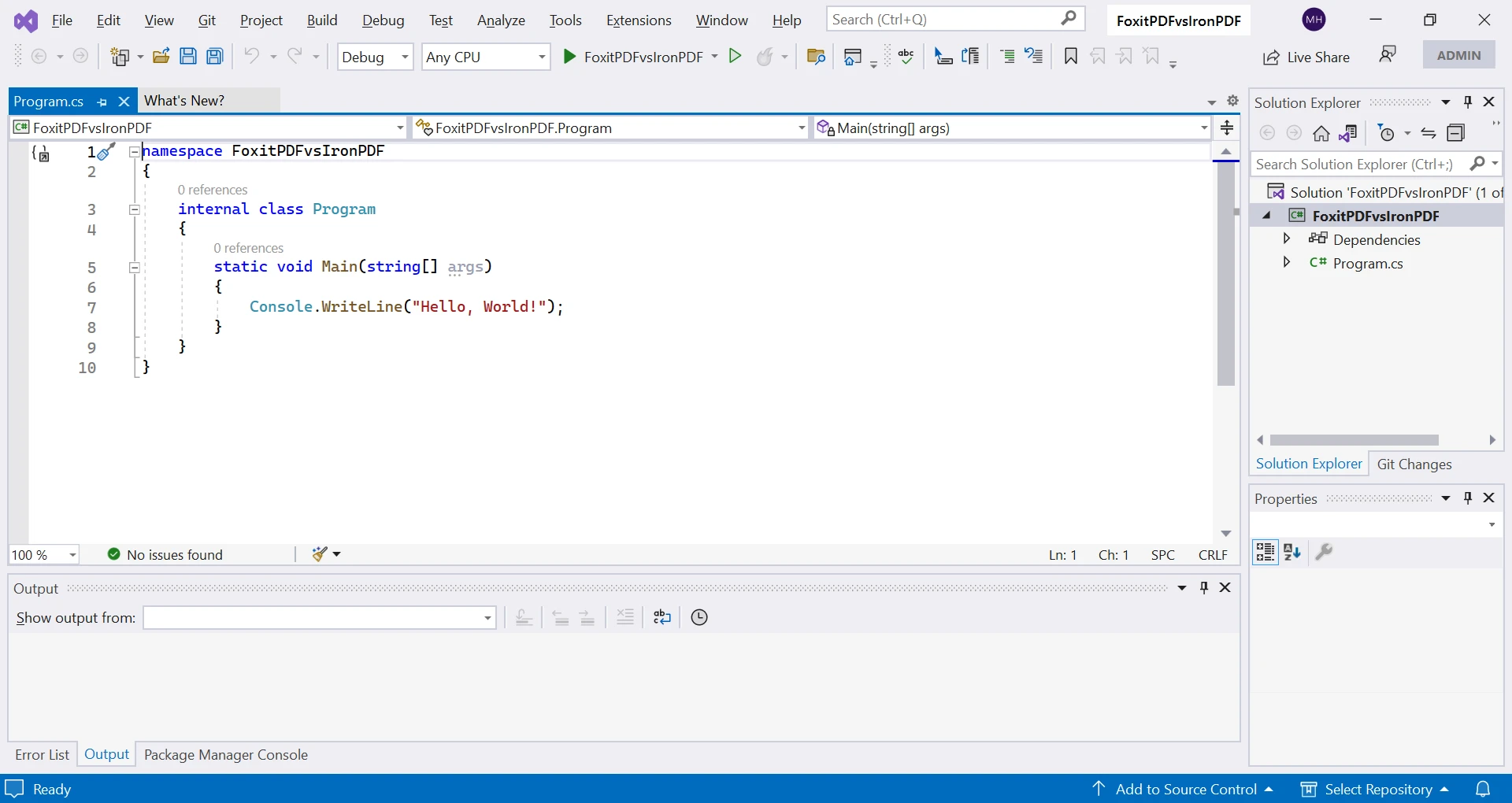
How Do I Create PDFs with IronPDF?
You need to install the IronPDF NuGet Package in your project:
Click "Tools" menu, select "NuGet Package Manager" then "Package Manager Console".
In the Package Manager Console window, type:
Install-Package IronPdfPress "Enter" to execute. Wait for installation and dependency resolution.
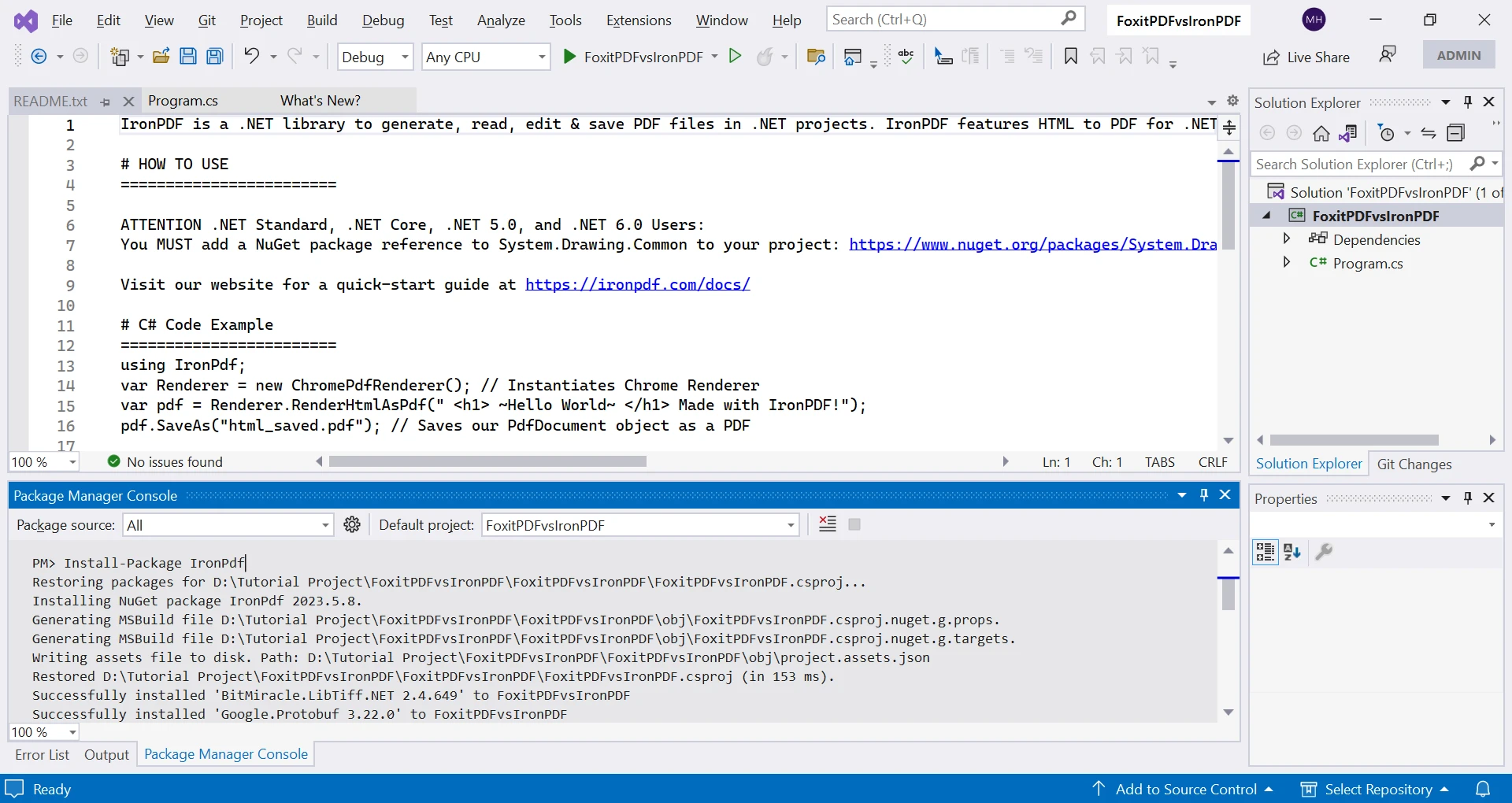
Once complete, you can start using IronPDF by adding using statements and calling IronPDF APIs. For enterprise deployment guidance, see the installation overview. Additional methods include Windows Installer and advanced NuGet configuration.
// This C# code demonstrates using IronPDF to create a new PDF from HTML content.
static void Main(string[] args)
{
// Create an instance of ChromePdfRenderer to render HTML as a PDF document.
var renderer = new ChromePdfRenderer();
// Convert HTML content to a PDF document using RenderHtmlAsPdf.
var pdfDoc = renderer.RenderHtmlAsPdf("This is my PDF file created by IronPDF.");
// Save the PDF document to the filename "IronPDF.pdf".
pdfDoc.SaveAs("IronPDF.pdf");
}// This C# code demonstrates using IronPDF to create a new PDF from HTML content.
static void Main(string[] args)
{
// Create an instance of ChromePdfRenderer to render HTML as a PDF document.
var renderer = new ChromePdfRenderer();
// Convert HTML content to a PDF document using RenderHtmlAsPdf.
var pdfDoc = renderer.RenderHtmlAsPdf("This is my PDF file created by IronPDF.");
// Save the PDF document to the filename "IronPDF.pdf".
pdfDoc.SaveAs("IronPDF.pdf");
}The code above generates a PDF from an HTML string. It creates a ChromePdfRenderer instance for HTML to PDF rendering. It calls RenderHtmlAsPdf to create a PDF from the HTML string. Finally, it saves the PDF as "IronPDF.pdf" using SaveAs. For advanced saving options, see export and save PDF documentation. You can save PDFs to memory streams or export different PDF versions.
You've generated and saved the PDF in just three lines of code. This demonstrates IronPDF's simplicity and ease of use. For more examples, see the code examples section.
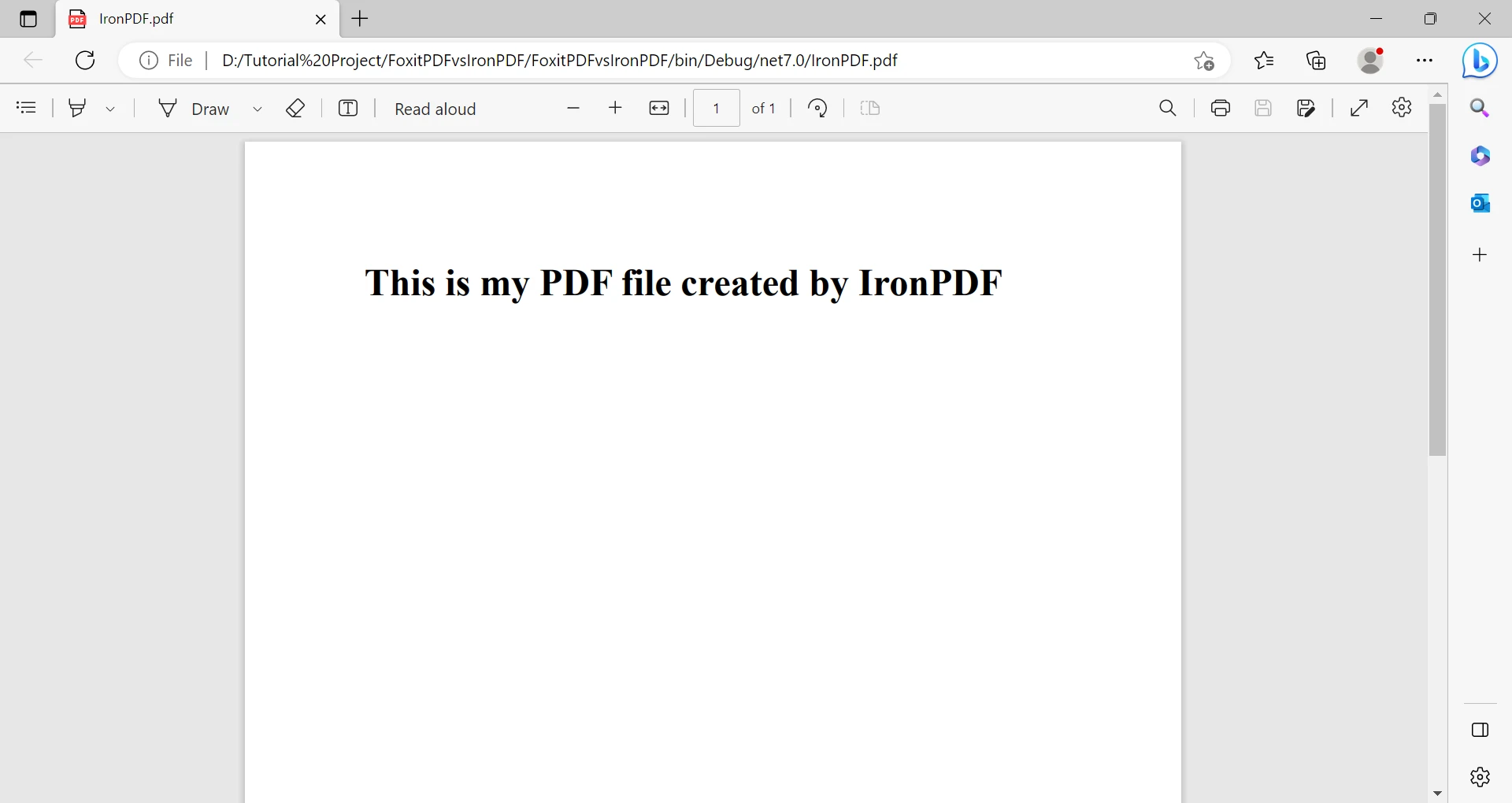
For detailed code examples and tutorials, visit IronPDF's official API documentation. Additional tutorials cover creating PDFs, editing PDFs, and organizing PDFs.
How Do I Create PDFs with Foxit PDF SDK?
In the Package Manager Console window, type:
Install-Package Foxit.SDK.DotnetPress "Enter" to execute. Wait for package installation and dependency resolution.
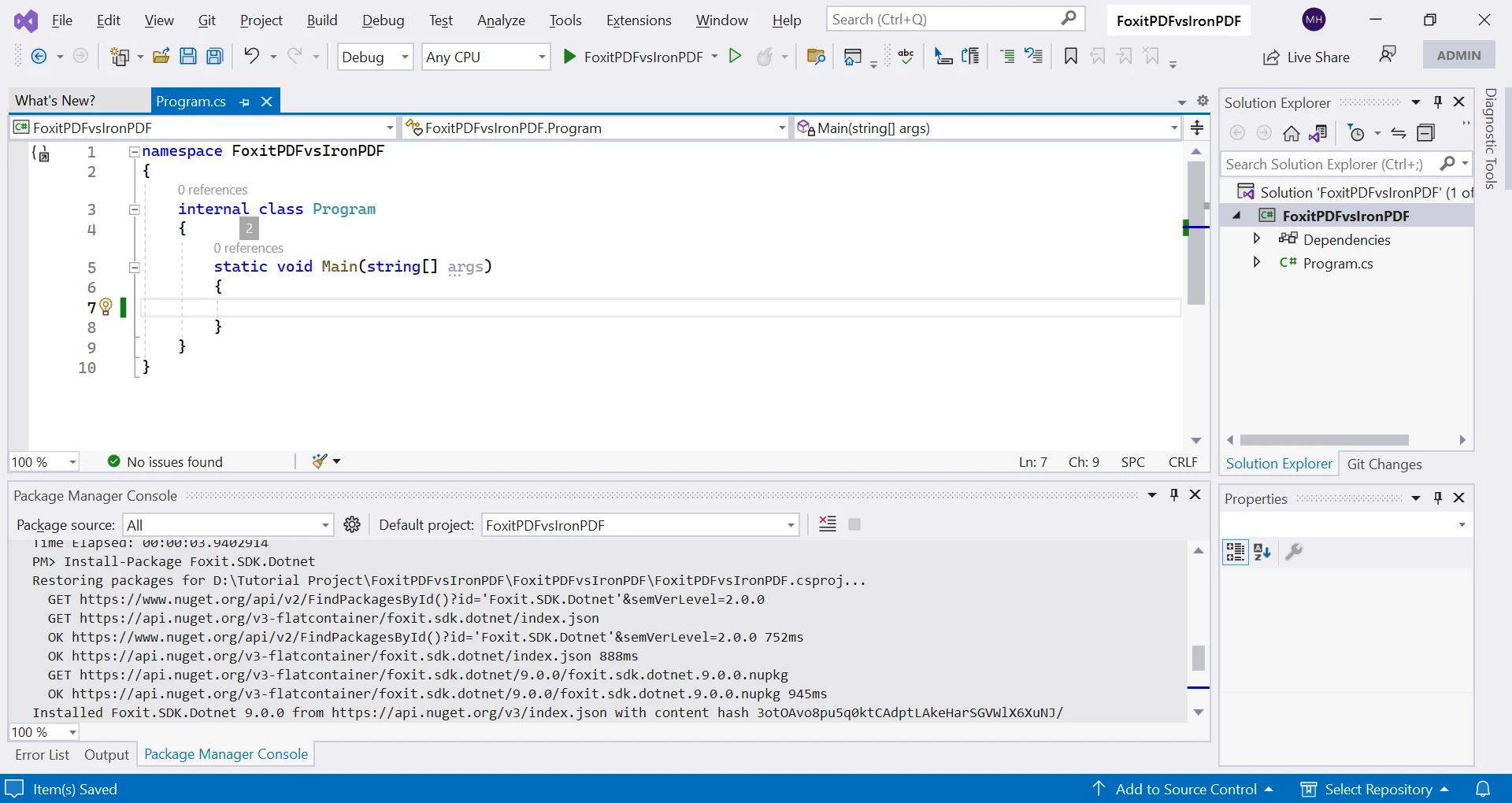
Once complete, you can use Foxit PDF by adding using statements and calling Foxit PDF APIs.
// This C# code demonstrates creating a simple PDF document using Foxit PDF SDK.
using (var doc = new PDFDoc())
{
// Insert a new page in the PDF document.
var page = doc.InsertPage(0, PDFPage.Size.e_SizeLetter);
// Define a rectangular area where text will be added on the page.
RectF rect = new RectF(100, 50, 220, 100);
// Create a style for the text to be added.
RichTextStyle richtext_style = new RichTextStyle();
// Add text to the page within the defined rectangle.
page.AddText("This is my PDF generated by Foxit PDF.", rect, richtext_style);
// Save the document as a PDF file on the disk.
doc.SaveAs("FoxitPDF.pdf", 0);
}// This C# code demonstrates creating a simple PDF document using Foxit PDF SDK.
using (var doc = new PDFDoc())
{
// Insert a new page in the PDF document.
var page = doc.InsertPage(0, PDFPage.Size.e_SizeLetter);
// Define a rectangular area where text will be added on the page.
RectF rect = new RectF(100, 50, 220, 100);
// Create a style for the text to be added.
RichTextStyle richtext_style = new RichTextStyle();
// Add text to the page within the defined rectangle.
page.AddText("This is my PDF generated by Foxit PDF.", rect, richtext_style);
// Save the document as a PDF file on the disk.
doc.SaveAs("FoxitPDF.pdf", 0);
}This library requires more effort for basic tasks, as shown in this code creating a simple PDF. Visit their official documentation for API details. For simpler PDF creation, see IronPDF's create new PDFs guide. IronPDF offers templates for common PDF types and form creation capabilities.
Can I Convert HTML to PDF with IronPDF?
The following code demonstrates creating PDFs from HTML using IronPDF's HTML to PDF converter. IronPDF converts from HTML files, HTML strings, and HTML ZIP files.
// This C# code demonstrates converting HTML to PDF using IronPDF.
static void Main(string[] args)
{
// HTML content to be converted to PDF.
string htmlText = "This is a PDF created from an HTML string using IronPDF.";
// Create an instance of ChromePdfRenderer for rendering HTML to PDF.
var renderer = new ChromePdfRenderer();
// Render the HTML content as a PDF document.
PdfDocument pdf = renderer.RenderHtmlAsPdf(htmlText);
// Save the PDF document to the filename "htmlToPDF.pdf".
pdf.SaveAs("htmlToPDF.pdf");
}// This C# code demonstrates converting HTML to PDF using IronPDF.
static void Main(string[] args)
{
// HTML content to be converted to PDF.
string htmlText = "This is a PDF created from an HTML string using IronPDF.";
// Create an instance of ChromePdfRenderer for rendering HTML to PDF.
var renderer = new ChromePdfRenderer();
// Render the HTML content as a PDF document.
PdfDocument pdf = renderer.RenderHtmlAsPdf(htmlText);
// Save the PDF document to the filename "htmlToPDF.pdf".
pdf.SaveAs("htmlToPDF.pdf");
}Additionally, you can create PDFs from a URL and HTML file using IronPDF. For complex HTML including JavaScript support and responsive CSS. IronPDF supports ASPX pages, Razor views, and Blazor components.
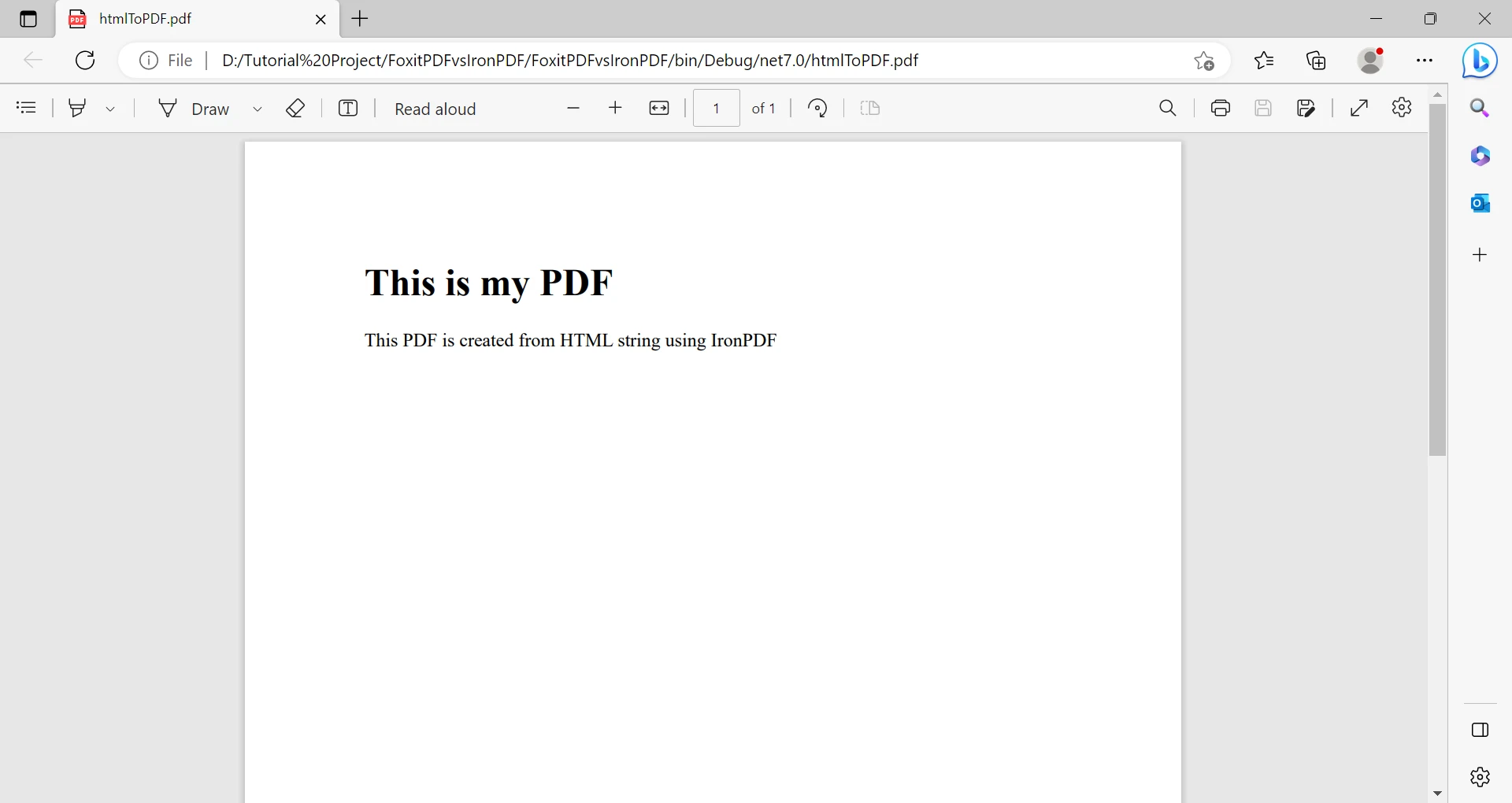
Can Foxit PDF SDK Convert HTML to PDF?
Foxit PDF Library doesn't support converting entire HTML documents to PDF. For teams needing HTML to PDF conversion, explore IronPDF's complete HTML conversion features. IronPDF provides specialized converters for Markdown to PDF, Angular to PDF, and JavaScript charts to PDF.
Now let's compare these SDKs in detail.
What Are the Key Differences Between IronPDF and Foxit PDF SDK?
Which SDK Offers Better HTML to PDF Conversion?
IronPDF provides excellent HTML to PDF conversion support. This advantage over Foxit SDK's lack of built-in HTML conversion proves particularly useful for generating dynamic PDFs from web pages or applications. For advanced HTML rendering, IronPDF supports pixel-perfect rendering and custom render delays. The library handles HTTP request headers and cookies for authenticated content.
IronPDF's HTML conversion offers high customization. You can specify options like page size, orientation, margins, and scaling, plus modify content before saving. IronPDF supports CSS styling for visually appealing PDFs. For asset handling, see the base URLs and asset encoding guide and DataURI embedding.
How Do Programming Language Capabilities Compare?
IronPDF works with any .NET language including C#, VB.NET, and F#. This simplifies adoption for developers familiar with these languages. Foxit PDF SDK has language bindings for several languages but may not support all languages you need. For comparing .NET libraries, see QuestPDF vs IronPDF and Syncfusion vs IronPDF.
IronPDF supports .NET Standard and .NET Core, enabling use on Windows, Linux, and macOS. This platform flexibility advantages you over Foxit PDF SDK's separate SDKs per operating system. IronPDF supports Android deployment and runs in Docker containers or as a remote service.
Which SDK Is Easier to Implement?
IronPDF provides a simple core API abstracting PDF creation and manipulation complexities. Its intuitive syntax lets you create and edit PDFs with minimal code, requiring less technical knowledge. The quickstart guide demonstrates this simplicity. Foxit PDF SDK requires explicit definition of almost everything. You need thorough SDK understanding and PDF specification knowledge for effective use. This results in longer development times and steeper learning curves. IronPDF's ease of use provides smooth development for faster productivity. For troubleshooting, see the quick troubleshooting guide.
How Do Security Features Compare Between SDKs?
Both IronPDF and Foxit PDF SDK protect PDFs from unauthorized access with password protection, encryption, and digital signatures. However, IronPDF offers greater encryption flexibility, letting you choose various algorithms and key lengths for tailored security. This flexibility proves crucial for applications handling sensitive or confidential data. Foxit PDF SDK may have limited encryption options insufficient for stricter security requirements. For enterprise compliance, IronPDF provides security documentation and supports hardware security modules. The library offers revision history tracking and document sanitization.
Which SDK Delivers Better Performance?
IronPDF processes PDF files quickly and efficiently. Improve algorithms ensure fast performance when processing PDFs. IronPDF handles large PDF files easily, making it excellent for applications processing large data. Performance improves further with async and multithreading support. Foxit PDF SDK may not match IronPDF's performance, especially with large PDFs, resulting in slower processing. For optimization techniques, see the IronPDF performance assistance guide. IronPDF supports parallel PDF generation and custom logging for performance monitoring.
How Do Licensing Models and Pricing Compare?
IronPDF offers flexible licensing and pricing for your individual or organizational needs. It's free for development with a free trial for commercial licenses. The perpetual licensing model means you use it indefinitely after purchase without additional fees. IronPDF offers various licenses including single developer, team, and site options, helping you choose what fits best. For licensing management, see the license keys guide. IronPDF offers license extensions and upgrade options.
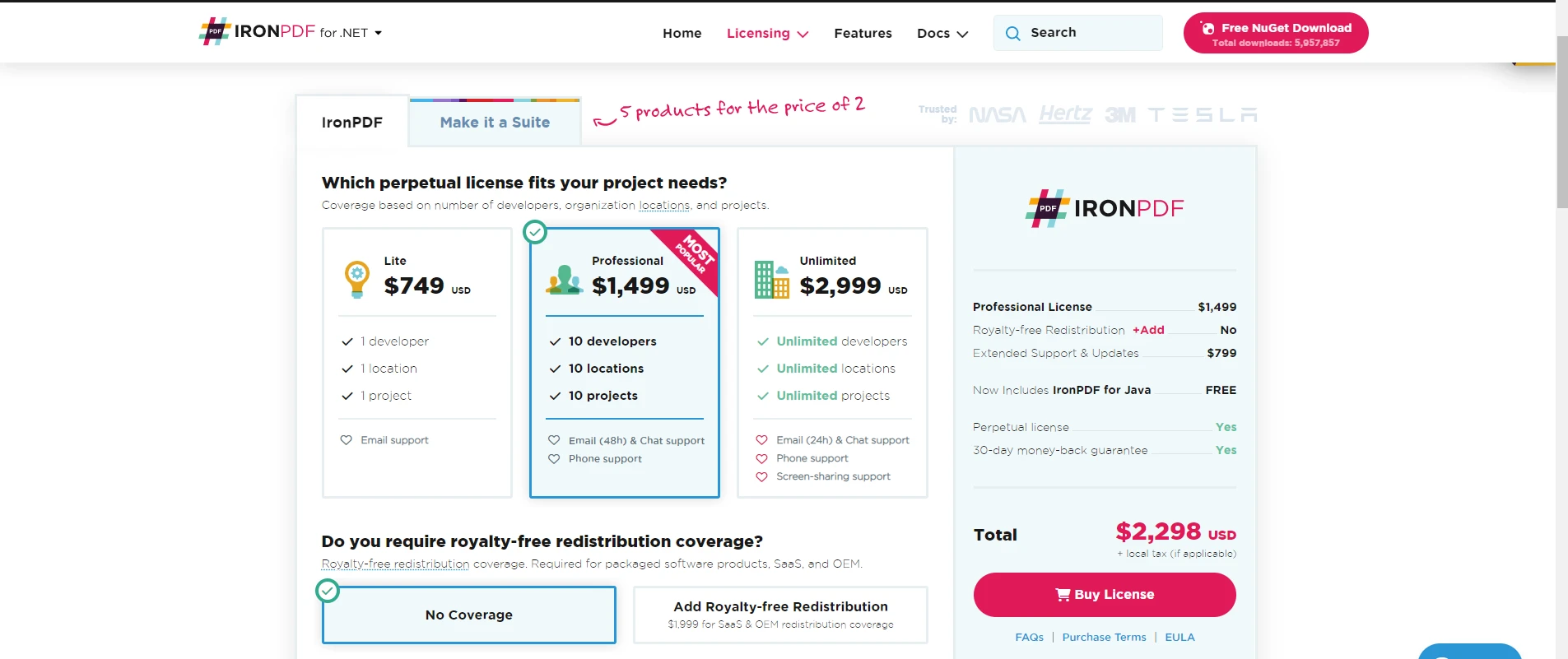
Foxit PDF SDK uses subscription-based licensing requiring recurring fees. Foxit PDF SDK licensing starts at $3,000 per platform yearly. This proves expensive for long-term projects or numerous licenses. Foxit PDF SDK's limited licensing options may not suit all organizations. For alternative pricing, see Apryse vs IronPDF comparison.
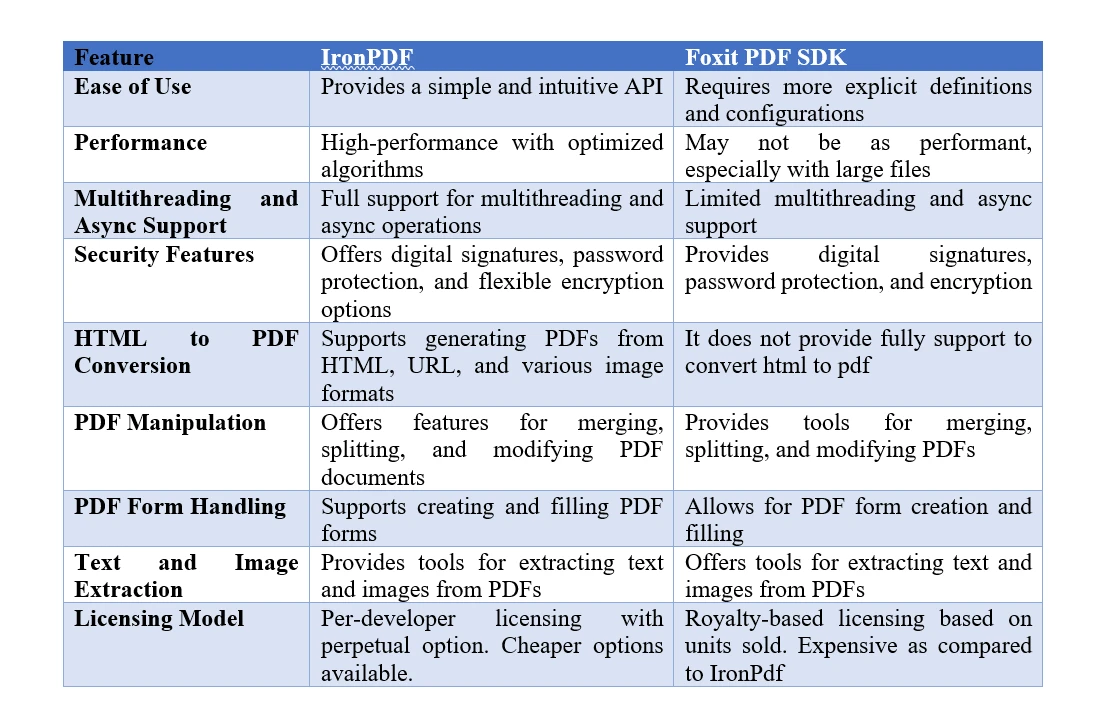
Which PDF SDK Should Enterprise Architects Choose?
IronPDF delivers effective PDF processing with exceptional ease of use and reliable functionality. Built on a Chromium-based rendering engine, it provides you with a simple API for creating, manipulating, and rendering PDFs. With extensive HTML, CSS, JavaScript, and image format support, IronPDF enables smooth conversion of web content into high-quality PDFs. It offers multithreading and asynchronous support for improve performance and scalability. Additionally, IronPDF provides advanced security including encryption, digital signatures, and password protection. Its complete classes and functions for PDF manipulation, form handling, and text extraction make it versatile for various PDF tasks. IronPDF enable you with a reliable framework for PDF processing in your applications. For additional features, explore PDF compression, watermarking, and page numbering.
Foxit PDF SDK provides complete PDF processing capabilities for your development needs. It offers extensive tools for creating, editing, and manipulating PDFs. With its API, you have fine-grained control over text, images, annotations, and form fields. Foxit PDF SDK ensures compatibility through reliable PDF standards support. Its features include encryption, digital signatures, and password protection for sensitive data. The SDK provides high-performance rendering for smooth PDF display. With Foxit PDF SDK, you can build sophisticated PDF applications with custom workflows, document automation, and system integration.
IronPDF offers more cost-effective licensing than Foxit PDF SDK, making it affordable for your development needs. IronPDF's per-developer licensing allows your entire team to use one license. This enables collaboration without additional licensing costs per team member. IronPDF offers perpetual licensing for indefinite use without future update fees. Foxit PDF SDK's royalty-based model requires fees based on units sold. This results in higher costs for applications with large user bases. IronPDF's licensing structure provides cost-effective solutions, saving licensing expenses while delivering effective PDF capabilities.
IronPDF provides several technical advantages over Foxit PDF. IronPDF offers an intuitive, developer-friendly API for easier integration. Its straightforward API enables simplify PDF processing, reducing your development time. IronPDF provides reliable HTML, CSS, JavaScript, and image format support for smooth web-to-PDF conversion. It offers multithreading and asynchronous support for performance and scalability with large PDFs. IronPDF's flexible encryption options let you choose algorithms and key lengths for security customization. IronPDF's per-developer and perpetual licensing proves more cost-effective. Overall, IronPDF excels in ease of use, functionality, and cost-efficiency.
IronPDF joins the Iron Suite, a collection improve your development capabilities. The Suite includes IronOCR for optical character recognition, IronPDF for PDF processing, IronBarcode for barcode generation, IronXL for Excel manipulation, and IronWebscraper for web data extraction. By purchasing the complete Suite, you use five products' combined power for complete development needs at two products' cost. For enterprise document security, consider IronSecureDoc for advanced protection. For demonstrations, visit the demos page.
Frequently Asked Questions
What are the differences between Foxit PDF SDK and IronPDF?
IronPDF and Foxit PDF SDK are both popular for handling PDF tasks in .NET applications. IronPDF offers superior HTML to PDF conversion, robust security features, and a cost-effective licensing model, while Foxit provides strong support for file formats and PDF annotation capabilities.
How can I convert HTML to PDF in a .NET application?
You can use IronPDF's RenderHtmlAsPdf method to convert HTML strings into PDFs. Additionally, you can convert HTML files using RenderHtmlFileAsPdf.
What are the security features of IronPDF?
IronPDF provides comprehensive security features including password protection, encryption options, digital signatures, and certificate management to safeguard PDF documents.
How does IronPDF support multithreading and asynchronous operations?
IronPDF is designed to support multithreading and asynchronous operations, allowing developers to handle multiple PDF processing tasks efficiently within .NET applications.
Can IronPDF be used on different operating systems?
Yes, IronPDF supports .NET Standard and .NET Core, making it compatible with Windows, Linux, and macOS platforms.
What is a basic code example for creating a PDF using IronPDF?
A basic example with IronPDF involves creating an instance of ChromePdfRenderer, rendering HTML content into a PDF document, and saving it to disk.
What advantages does IronPDF offer over subscription-based PDF SDKs?
IronPDF offers a cost-effective licensing model with per-developer and perpetual options, providing a more affordable solution compared to subscription-based models.
What is the Iron Suite?
The Iron Suite is a collection of powerful development tools, including IronOCR, IronPDF, IronBarcode, IronXL, and IronWebscraper, designed to enhance developer productivity.


